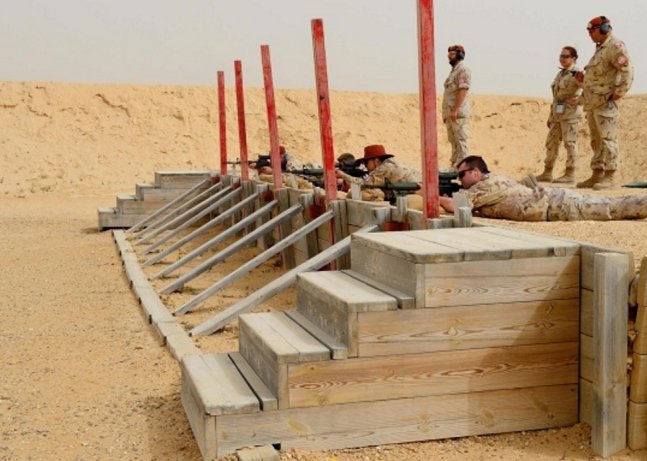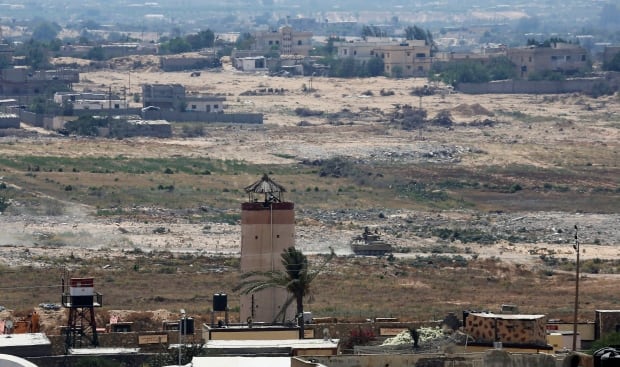

By Evan Dyer, CBC News
Editor’s note: Just skimmed this breaking article, but some of it appears to lay blame to ISIS or whatever they want to call them this week. I can say the June 9 attack was pin point, and was NOT ISIS as my then company commander watched from his HQ rooftop an Egyptian tank fire a round on our base. We were bombarded all day. I have an EOD contact who tells me stories of the opposition guys firing warning shots near them as they tried to remove an IED with their robot. The opposition did not target the MFO, nor did they shoot any of the EOD guys, but once they left the IED alone, they returned safely back to base. Heard stories of Fiji Battalion guys at their outposts just outside NC reporting the opposition would actually tell them which roads NOT to take back to NC.
Canadian military police officers are shown during a transfer of responsibility parade in the Sinai, Egypt in March, 2015. Canadian members of the multinational peacekeeping force in Egypt face increasing threats from ISIS, according to a government briefing note. (Sgt. Tom Duval, U.S. Army/Combat Camera/DND)
- PM invokes Canada’s peacekeeping past in seeking UN Security Council seat
- Trudeau unveils Canada’s plan to seek 2021 UN Security Council seat
- The not inconsiderable cost of ‘re-engaging’ with the UN: Chris Hall
- Canadian military ill-prepared for modern peacekeeping: report
- Canada’s ISIS fight must factor in ‘ripple effect,’ Harjit Sajjan says
Canada’s biggest peacekeeping deployment is at growing risk of attack by a particularly aggressive branch of ISIS, according to a government briefing note obtained by CBC News.
In a briefing note prepared for Foreign Affairs Minister Stéphane Dion in early November, officials warn that an “escalation of terrorist activity in the Sinai Peninsula poses new challenges with respect to the security of (Multinational Force and Observer) personnel, and has raised concerns about force protection.”
- PM invokes Canada’s peacekeeping past
- Pitch for UN security seat will cost ‘political capital’
- Canadian military ill-prepared for modern peacekeeping
- What should Canada’s role be in the UN?
Canada currently leads the MFO mission in the desert peninsula that lies to the south of the border between Egypt, Israel and the Gaza Strip. Seventy Canadian peacekeepers form part of the 1,600-man force, representing a majority of all Canadians involved in peacekeeping around the world.
The MFO has been present in the Sinai for nearly four decades, since the Camp David accords brought about peace between Egypt and Israel. The last major armed conflict between the two countries was the Yom Kippur War of 1973, fought largely in the Sinai.
But the Sinai Peninsula is also home to an aggressive jihadist insurgency that has grown rapidly since the Egyptian Revolution of 2011.
In 2014, the largest of the Sinai’s jihadi groups, Ansar Bayt al-Maqdis, pledged allegiance to Abu Bakr al-Baghdadi, the self-appointed caliph of the Islamic State in Iraq and Syria (ISIS), and renamed itself Wilayat Sinai (the “Sinai Province” of the Islamic State.)
It has since killed hundreds of members of Egypt’s security forces. The group is well-armed, and has used a range of heavier weapons, including surface-to-air missiles, mortars, Grad and Katyusha rockets and Russian Kornet anti-tank missiles.
Its leadership includes a number of former officers of the Egyptian military, and it is thought to have imported tactics and expertise from its mother organization in Iraq and Syria, including in the construction of truck bombs.
Militants target peacekeepers
“Until recently, the MFO had not been the direct target of jihadist or terrorist attacks,” reads the briefing note. “However, the threat environment has changed over the summer months of 2015.”
The report details an escalating campaign of attacks against the force led by Canadian Maj.-Gen. Denis Thompson, which includes peacekeepers from 12 nations.
- Canadian general leads Sinai peacekeeping force
Last June, the northernmost MFO base at al-Gorah, where the Canadian peacekeepers are stationed, was hit by a Wilayat Sinai mortar attack, with several direct hits on the camp but no injuries.
In August, a U.S. soldier was shot and wounded by a sniper, again believed to belong to the local ISIS chapter. Four weeks later, an IED struck an MFO vehicle carrying two Fijian peacekeepers. U.S. peacekeepers who rushed to assist the wounded Fijians were struck by a second bomb. Although no-one was killed in the incident, all six soldiers required air evacuation for their injuries.

An Egyptian armored vehicle patrols next to a military watch tower on the Egyptian side of the border, seen from the south of the Gaza Strip, last July. (Adel Hana/Associated Press)
The group has also targeted Western civilians in the Sinai, including Croatian engineer Tomislav Salopek, who was kidnapped and beheaded last summer. Around the same time, the group detonated a car bomb outside the Italian consulate in Cairo.
In the most serious incident, a Russian passenger jet carrying 224 tourists home from Egypt crashed in Sinai last October. The Sinai branch of ISIS claimed responsibility and although the official investigation continues, both Russian authorities and Egyptian President Abdel Fattah el-Sisi say that it was caused by a bomb.
If confirmed, the downing of KGL 9268 is the single deadliest attack by ISIS outside of its home base of Iraq and Syria.
MFO moves forces to safer area
Not surprisingly, “there is increasing concern among troop-contributing countries regarding the security situation in the Sinai,” according to Dion’s briefing note.

Part of Canada’s contingent of the Multinational Force and Observers (MFO) in Sinai, Egypt are shown on the rifle range in 2013. Foreign Affairs Minister Stéphane Dion has been warned that the security situation for Canada’s largest peacekeeping deployment is deteriorating rapidly. (Patrick Blanchard/Canadian Forces Combat Camera/DND)
“The mission has recently abandoned two small observation posts due to the security situation,” says the note, adding that the U.S. has reinforced its Sinai contingent with another 75 troops.
Because ISIS is stronger in the north, MFO is moving peacekeepers hundreds of kilometres to a base near Sharm el-Sheikh at the mouth of the Gulf of Suez.
A spokesman at MFO’s administrative offices in Rome told CBC that “rebalancing efforts are underway to relocate staff from our North Camp to our South Camp,” but declined to provide more specific details for security reasons.
Canada is welcoming the move.
“As a long-time supporter of and contributor to the MFO, we support the work the organization has done to rebalance its forces from the north to the south in response to the evolving security situation. This is a necessary measure to safeguard force protection while ensuring that the MFO remains able to fulfil its mandate,” Jordan Owens said in an email to CBC News Wednesday.
But a spokesman for the Canadian Forces Joint Operations Command HQ told CBC News Thursday that some Canadian troops will continue to serve at Al Gorah in the north, a camp that ISIS has attacked in what he described as “a series of incidents.”
Despite the security concerns, Canada agreed to a request to extend Thompson’s term as the MFO’s force commander — due to end this month — by another year, to March 2017.
Thompson maintains offices at both the southern and northern camps and travels throughout the Sinai.
- Canadian Denis Thompson leads Sinai peacekeeping force
- Canadian takes control of Sinai force
- Quebecer among peacekeepers killed in Sinai plane crash
The document is a reminder that even as Canada ends its combat mission against ISIS and refocuses its military on peacekeeping, threats remain — including the threat from ISIS.
But the 70 Canadian soldiers facing ISIS in the Sinai have received far less attention than the 69 Canadian soldiers training Kurdish peshmerga to fight ISIS in Iraq.
“Media reporting of Canada’s contribution to the MFO mission in the Sinai is modest,” notes the briefing document.
Corrections
-
This story has been revised from an earlier version that incorrectly identified the Multinational Force and Observers as connected to the United Nations. In fact, the MFO is an independent organization established by Egypt and Israel to carry out peacekeeping in the Sinai.Mar 31, 2016 6:59 PM ET
ATTENTION READERS
We See The World From All Sides and Want YOU To Be Fully InformedIn fact, intentional disinformation is a disgraceful scourge in media today. So to assuage any possible errant incorrect information posted herein, we strongly encourage you to seek corroboration from other non-VT sources before forming an educated opinion.
About VT - Policies & Disclosures - Comment Policy




Comments are closed.